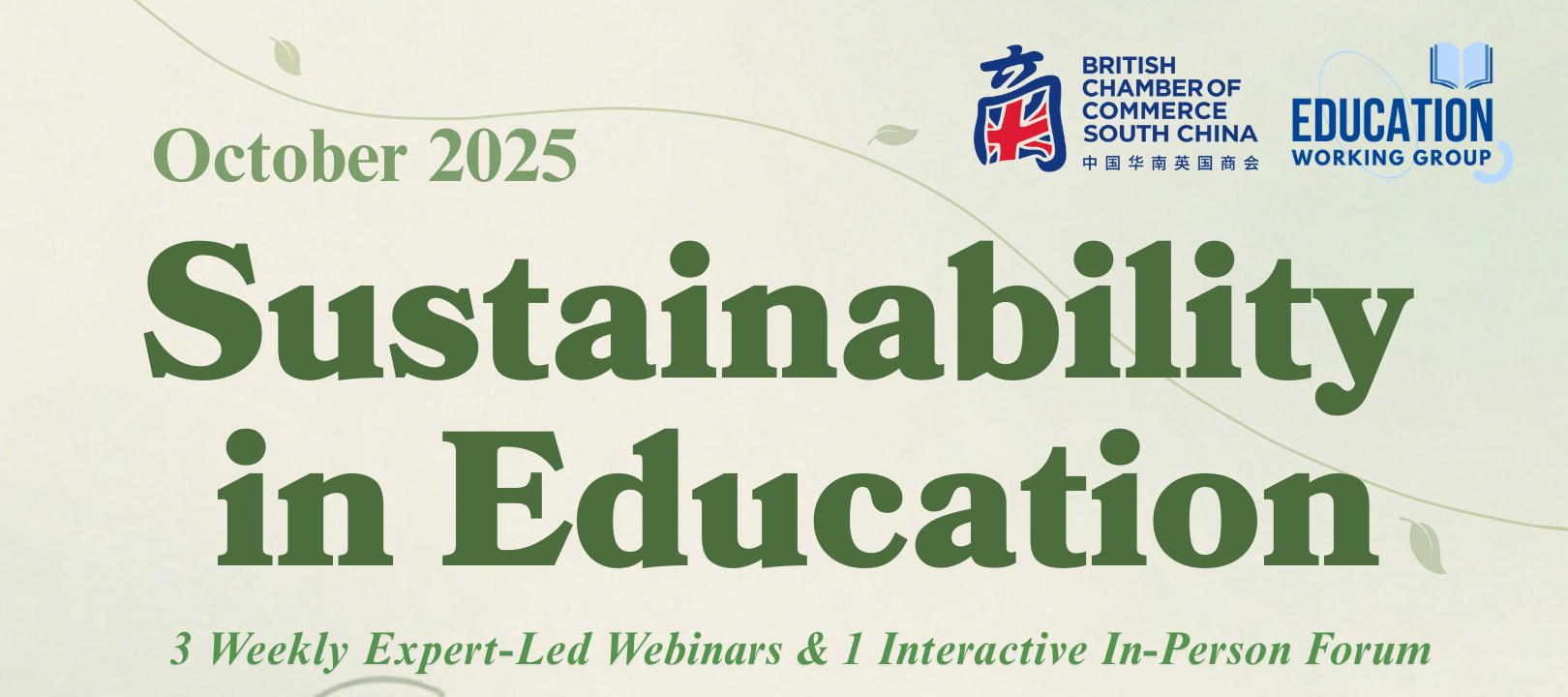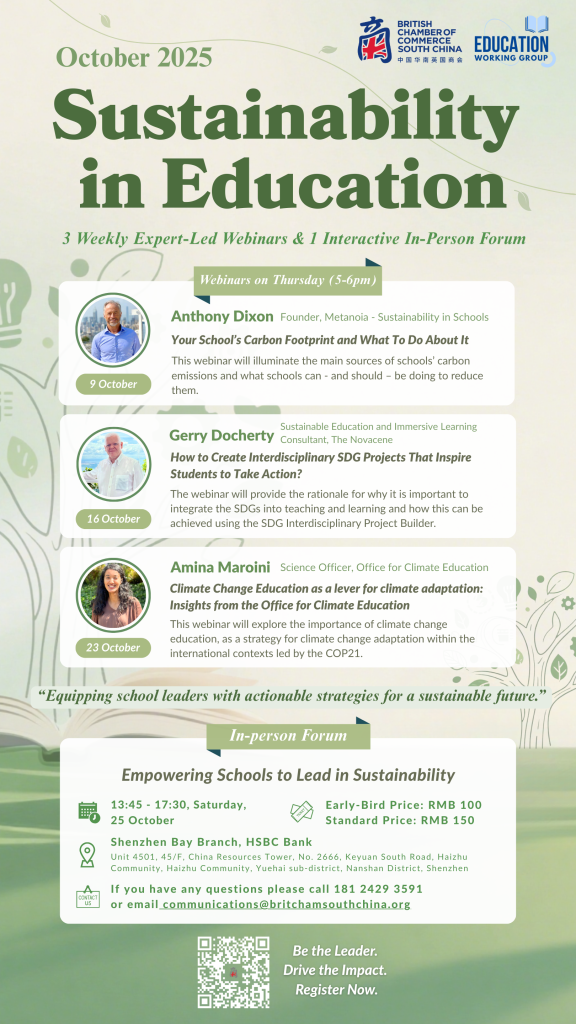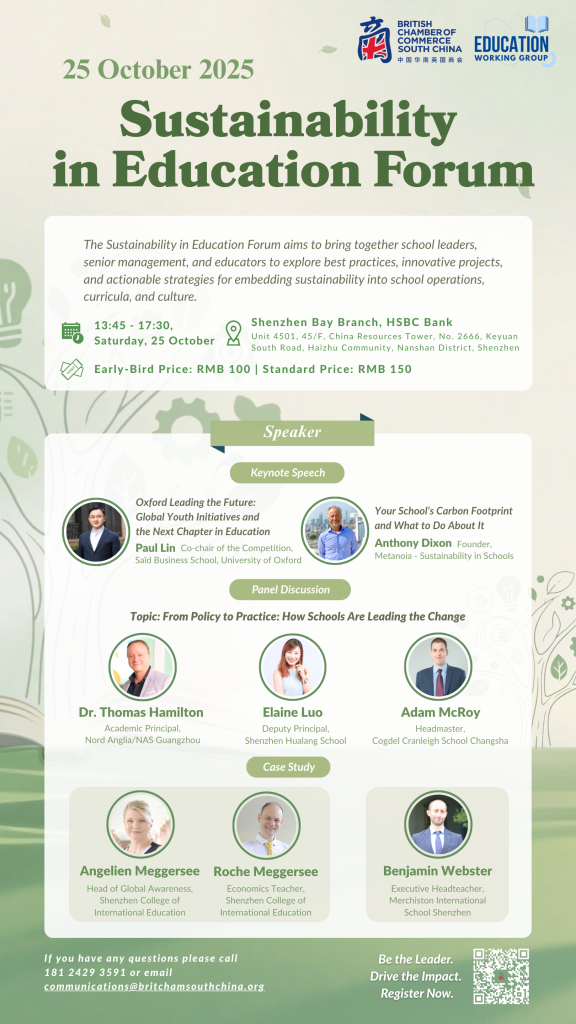Transform Your School: From Sustainable Intention to Action

Sustainability is no longer an option—it’s a necessity. As pivotal hubs for shaping future generations, schools have a profound responsibility and opportunity to lead the way. But where do you begin?
This October, the British Chamber of Commerce South China invites school leaders, senior management, and educators to a transformative event series: Sustainability in Education.
Throughout the month, we will explore practical, impactful strategies for embedding sustainability into the very fabric of your school—from operations and curriculum to campus culture.
Kickstarting with three deep-dive online webinars every Thursday, and culminating in a dynamic in-person forum on Saturday, this series is your comprehensive guide to turning intention into action.


Our October Line-Up:
9 Oct 5-6 PM

Online Webinar 1: “Your School’s Carbon Footprint and What To Do About It”
Speaker: Anthony Dixon
While most schools teach about climate change and the Sustainable Development Goals in the classroom, very few have a clear picture of their own carbon footprint, which activities generate the most emissions, or what practical measures could really make a difference in reducing them.
By addressing these questions, schools can not only take responsibility for their emissions but also provide important experiential learning opportunities for students.
16 Oct 5-6 PM

Online Webinar 2: “How to Create Interdisciplinary SDG Projects That Inspire Action?”
Speaker: Gerry Docherty
- The importance of integrating the SDGs into Teaching and Learning in Schools
- How to build an Interdisciplinary project using the SDG Project Builder
- Overcoming Challenges and Maximising Impact
23 Oct 5-6 PM

Online Webinar 3: “Climate Change Education as a Lever for Adaptation”
Speaker: Amina Maroini
- Climate Change Education can be a lever for climate change adaptation.
- Climate Change Education is complex: It must build on strong science education and active pedagogies.
- Going beyond the knowledge-only approach is essential for a quality climate change education.
- Effective teacher education for CCE incorporates active learning, supports interdisciplinary collaboration and offers feedback and reflection.
25 Oct 1:45 PM-5:30 PM
In-Person Forum: Empowering Schools to Lead in Sustainability
Address: Shenzhen Bay Branch, HSBC Bank (Unit 4501, 45/F, China Resources Tower,No.2666, Keyuan South Road, Haizhu Community, Yuehaisub-district, Nanshan District, Shenzhen)
This forum is more than just a series of talks; it’s a platform for collaboration, innovation, and empowerment. Gain practical tools, proven case studies from leading schools, and the inspiration to drive meaningful change.
Keynote Speech

“Oxford Leading the Future: Global Youth Initiatives and the Next Chapter in Education”
Speaker: Paul Lin
University of Oxford
For the first time, the University of Oxford is launching global youth initiatives for high school students and teachers, especially in climate change and sustainability. This talk will explore why this milestone is significant for schools, the key messages it conveys, and how schools can leverage this opportunity to enrich their super-curricular programs and support students’ university applications.

“Your School’s Carbon Footprint and What To Do About It”
Speaker: Anthony Dixon
Metanoia-Sustainability in School
Schools generate thousands of tons of CO₂ emissions every year. This talk will illuminate the main sources of these emissions and what schools can – and should – be doing to reduce them.
Panel Discussion
” From Policy to Practice: How Schools Are Leading the Change.”

Panelist: Dr. Thomas Hamilton
Nord Anglia/NAS Guangzhou

Panelist: Elaine Luo
Shenzhen Hualang School

Panelist: Adam McRoy
Cogdel Cranleigh School Changsha
Case Study 1
Empowering Student-Led Sustainability at SCIE

Speaker: Roche Meggersee
Shenzhen College of
International Education

Speaker: Angelien Meggersee
Shenzhen College of International Education
At SCIE, sustainability is fostered not through one flagship project, but through a culture of supporting independent, student-driven initiatives.
Case Study 2
The Green Campus Policy at MIS

Speaker: Benjamin Webster
Merchiston International School Shenzhen
The Green Campus Policy at MIS is established to promote environmental sustainability, reduce the school’s carbon footprint, and foster a culture of environmental responsibility among students, staff, and the wider school community. This policy aligns with the UN Sustainable Development Goals and our commitment to providing an outstanding education within a healthy, eco-friendly environment.
Empower your school.
Inspire your students.
Lead the change.

